Exploring Collaborative Mental Health Nursing: A Practice Report
VerifiedAdded on 2022/11/09
|10
|2731
|415
Report
AI Summary
This report delves into the critical importance of collaborative mental health nursing, emphasizing the nurse-consumer relationship and the understanding of lived experiences. It defines key terms such as 'collaborative nurse-consumer relationship' and 'lived experience,' highlighting their significance in providing patient-centered care. The report discusses the necessity for mental health nurses to comprehend the unique experiences of individuals living with mental disorders, emphasizing how this knowledge combats stigma and fosters empathetic care. It analyzes the author's personal practice, identifying communication with aggressive clients as an area for development, and explores evidence-based strategies, including training programs, to enhance skills in this area. The conclusion underscores the value of a collaborative approach in improving patient outcomes, addressing disparities in care, and aligning with professional nursing standards. The report references numerous peer-reviewed journal articles to support its arguments, providing a comprehensive overview of collaborative mental health nursing practice.
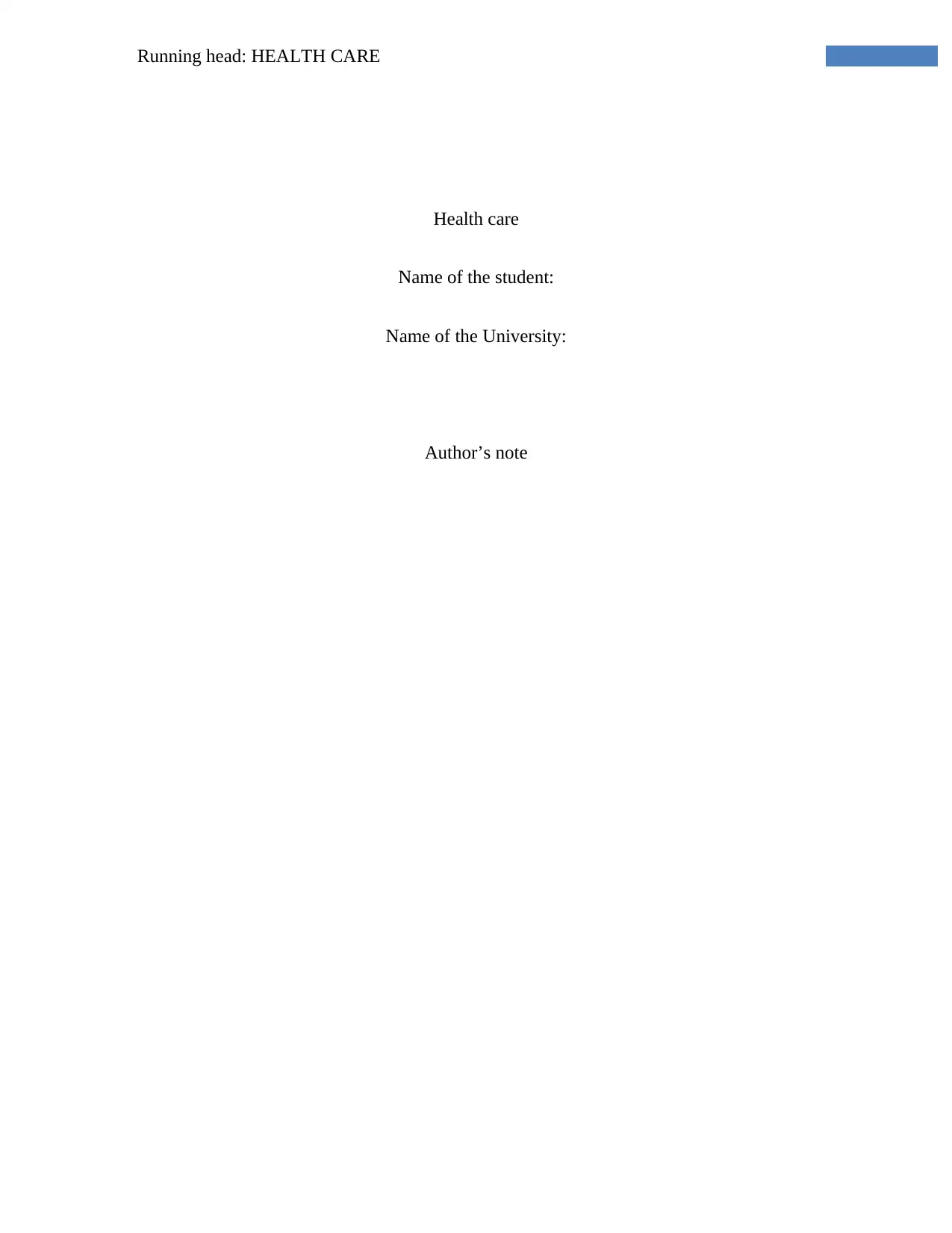
Running head: HEALTH CARE
Health care
Name of the student:
Name of the University:
Author’s note
Health care
Name of the student:
Name of the University:
Author’s note
Paraphrase This Document
Need a fresh take? Get an instant paraphrase of this document with our AI Paraphraser
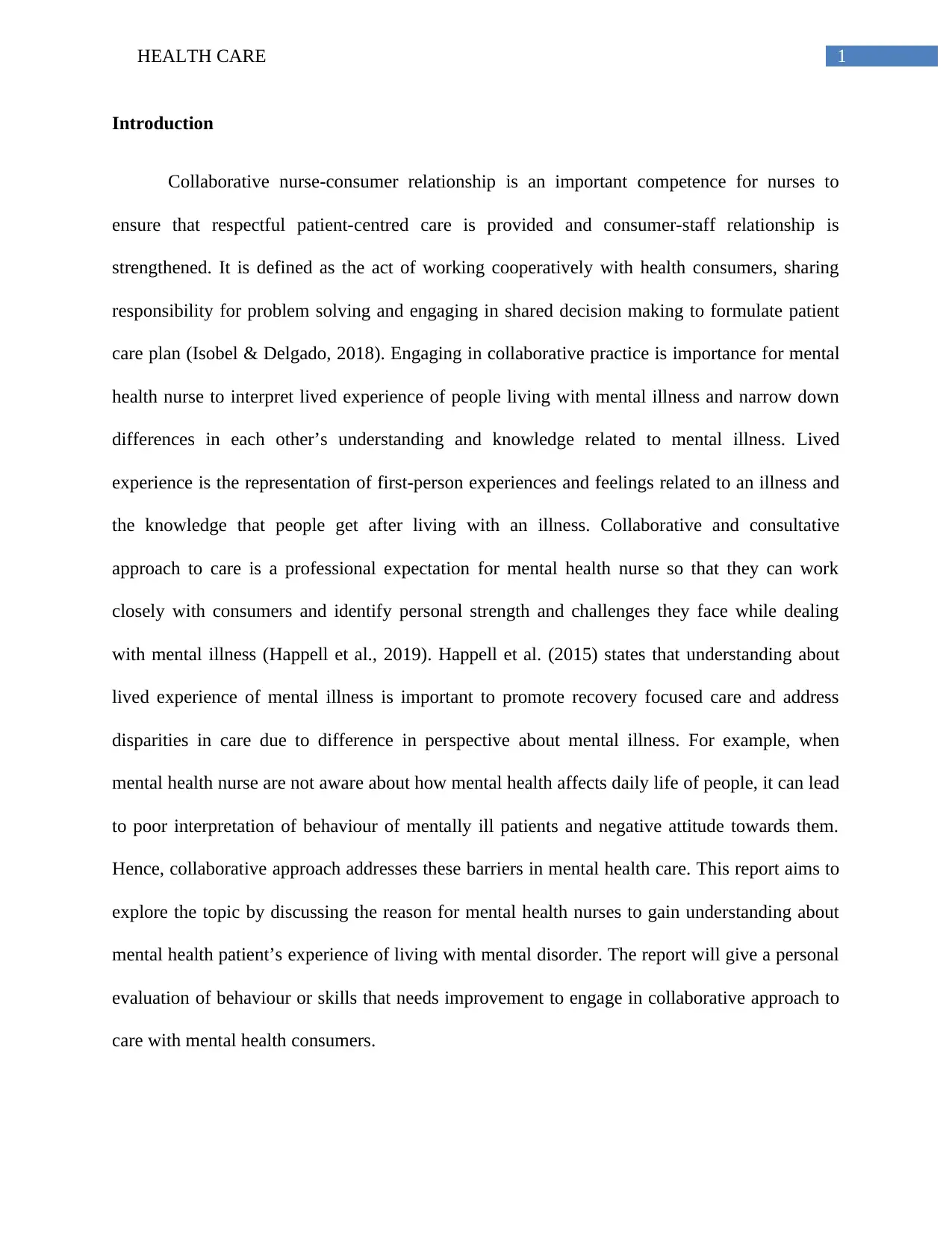
1HEALTH CARE
Introduction
Collaborative nurse-consumer relationship is an important competence for nurses to
ensure that respectful patient-centred care is provided and consumer-staff relationship is
strengthened. It is defined as the act of working cooperatively with health consumers, sharing
responsibility for problem solving and engaging in shared decision making to formulate patient
care plan (Isobel & Delgado, 2018). Engaging in collaborative practice is importance for mental
health nurse to interpret lived experience of people living with mental illness and narrow down
differences in each other’s understanding and knowledge related to mental illness. Lived
experience is the representation of first-person experiences and feelings related to an illness and
the knowledge that people get after living with an illness. Collaborative and consultative
approach to care is a professional expectation for mental health nurse so that they can work
closely with consumers and identify personal strength and challenges they face while dealing
with mental illness (Happell et al., 2019). Happell et al. (2015) states that understanding about
lived experience of mental illness is important to promote recovery focused care and address
disparities in care due to difference in perspective about mental illness. For example, when
mental health nurse are not aware about how mental health affects daily life of people, it can lead
to poor interpretation of behaviour of mentally ill patients and negative attitude towards them.
Hence, collaborative approach addresses these barriers in mental health care. This report aims to
explore the topic by discussing the reason for mental health nurses to gain understanding about
mental health patient’s experience of living with mental disorder. The report will give a personal
evaluation of behaviour or skills that needs improvement to engage in collaborative approach to
care with mental health consumers.
Introduction
Collaborative nurse-consumer relationship is an important competence for nurses to
ensure that respectful patient-centred care is provided and consumer-staff relationship is
strengthened. It is defined as the act of working cooperatively with health consumers, sharing
responsibility for problem solving and engaging in shared decision making to formulate patient
care plan (Isobel & Delgado, 2018). Engaging in collaborative practice is importance for mental
health nurse to interpret lived experience of people living with mental illness and narrow down
differences in each other’s understanding and knowledge related to mental illness. Lived
experience is the representation of first-person experiences and feelings related to an illness and
the knowledge that people get after living with an illness. Collaborative and consultative
approach to care is a professional expectation for mental health nurse so that they can work
closely with consumers and identify personal strength and challenges they face while dealing
with mental illness (Happell et al., 2019). Happell et al. (2015) states that understanding about
lived experience of mental illness is important to promote recovery focused care and address
disparities in care due to difference in perspective about mental illness. For example, when
mental health nurse are not aware about how mental health affects daily life of people, it can lead
to poor interpretation of behaviour of mentally ill patients and negative attitude towards them.
Hence, collaborative approach addresses these barriers in mental health care. This report aims to
explore the topic by discussing the reason for mental health nurses to gain understanding about
mental health patient’s experience of living with mental disorder. The report will give a personal
evaluation of behaviour or skills that needs improvement to engage in collaborative approach to
care with mental health consumers.
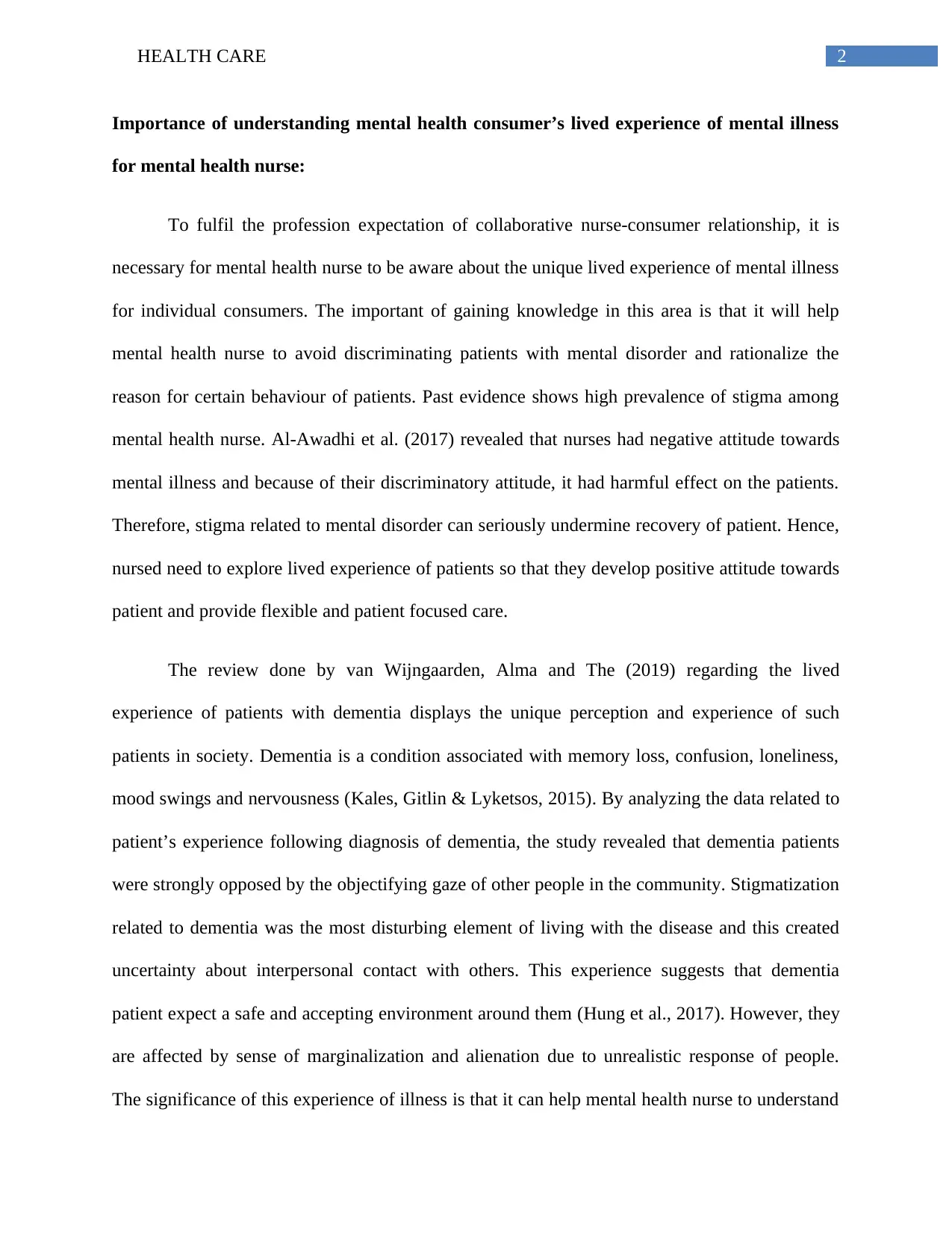
2HEALTH CARE
Importance of understanding mental health consumer’s lived experience of mental illness
for mental health nurse:
To fulfil the profession expectation of collaborative nurse-consumer relationship, it is
necessary for mental health nurse to be aware about the unique lived experience of mental illness
for individual consumers. The important of gaining knowledge in this area is that it will help
mental health nurse to avoid discriminating patients with mental disorder and rationalize the
reason for certain behaviour of patients. Past evidence shows high prevalence of stigma among
mental health nurse. Al-Awadhi et al. (2017) revealed that nurses had negative attitude towards
mental illness and because of their discriminatory attitude, it had harmful effect on the patients.
Therefore, stigma related to mental disorder can seriously undermine recovery of patient. Hence,
nursed need to explore lived experience of patients so that they develop positive attitude towards
patient and provide flexible and patient focused care.
The review done by van Wijngaarden, Alma and The (2019) regarding the lived
experience of patients with dementia displays the unique perception and experience of such
patients in society. Dementia is a condition associated with memory loss, confusion, loneliness,
mood swings and nervousness (Kales, Gitlin & Lyketsos, 2015). By analyzing the data related to
patient’s experience following diagnosis of dementia, the study revealed that dementia patients
were strongly opposed by the objectifying gaze of other people in the community. Stigmatization
related to dementia was the most disturbing element of living with the disease and this created
uncertainty about interpersonal contact with others. This experience suggests that dementia
patient expect a safe and accepting environment around them (Hung et al., 2017). However, they
are affected by sense of marginalization and alienation due to unrealistic response of people.
The significance of this experience of illness is that it can help mental health nurse to understand
Importance of understanding mental health consumer’s lived experience of mental illness
for mental health nurse:
To fulfil the profession expectation of collaborative nurse-consumer relationship, it is
necessary for mental health nurse to be aware about the unique lived experience of mental illness
for individual consumers. The important of gaining knowledge in this area is that it will help
mental health nurse to avoid discriminating patients with mental disorder and rationalize the
reason for certain behaviour of patients. Past evidence shows high prevalence of stigma among
mental health nurse. Al-Awadhi et al. (2017) revealed that nurses had negative attitude towards
mental illness and because of their discriminatory attitude, it had harmful effect on the patients.
Therefore, stigma related to mental disorder can seriously undermine recovery of patient. Hence,
nursed need to explore lived experience of patients so that they develop positive attitude towards
patient and provide flexible and patient focused care.
The review done by van Wijngaarden, Alma and The (2019) regarding the lived
experience of patients with dementia displays the unique perception and experience of such
patients in society. Dementia is a condition associated with memory loss, confusion, loneliness,
mood swings and nervousness (Kales, Gitlin & Lyketsos, 2015). By analyzing the data related to
patient’s experience following diagnosis of dementia, the study revealed that dementia patients
were strongly opposed by the objectifying gaze of other people in the community. Stigmatization
related to dementia was the most disturbing element of living with the disease and this created
uncertainty about interpersonal contact with others. This experience suggests that dementia
patient expect a safe and accepting environment around them (Hung et al., 2017). However, they
are affected by sense of marginalization and alienation due to unrealistic response of people.
The significance of this experience of illness is that it can help mental health nurse to understand
⊘ This is a preview!⊘
Do you want full access?
Subscribe today to unlock all pages.

Trusted by 1+ million students worldwide
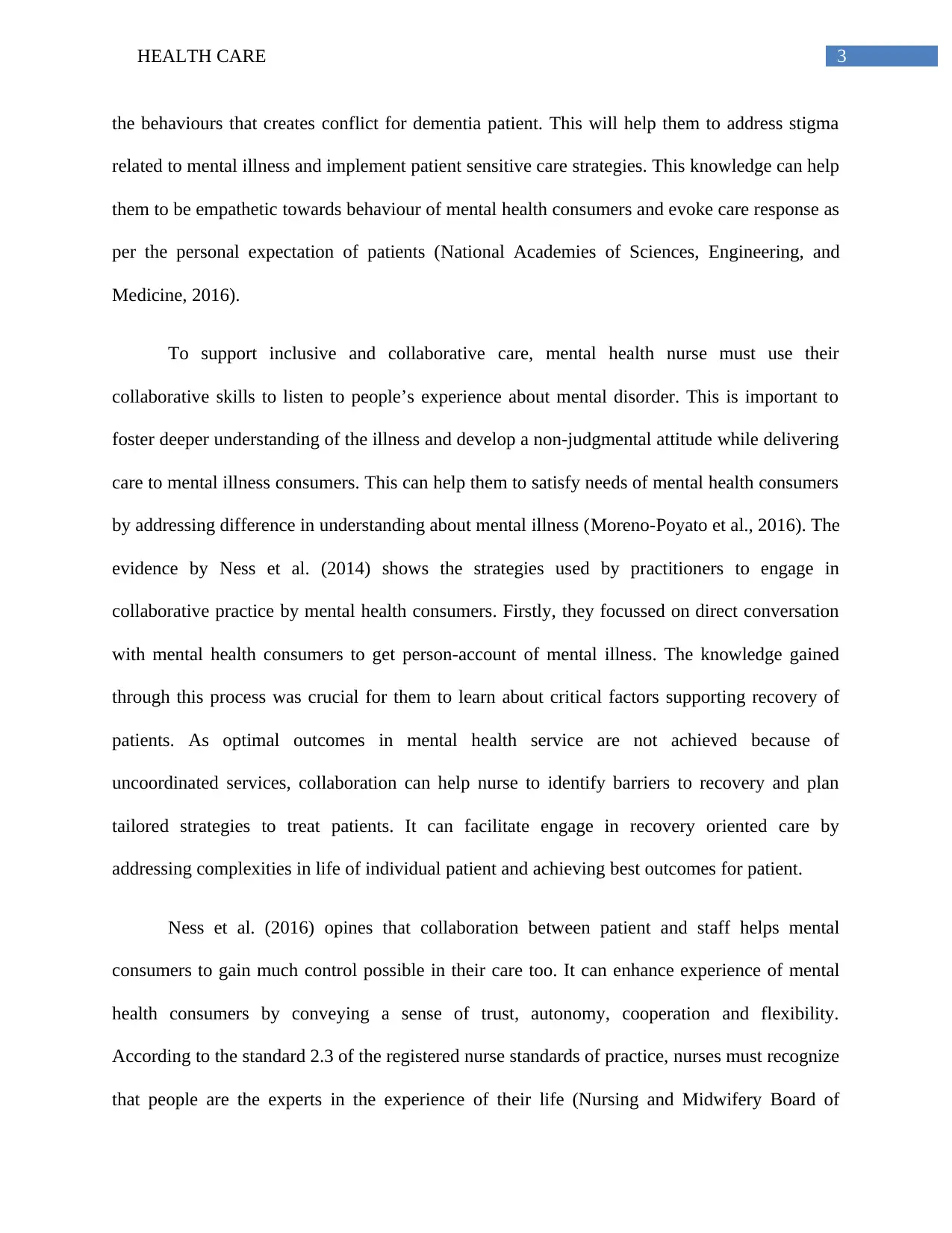
3HEALTH CARE
the behaviours that creates conflict for dementia patient. This will help them to address stigma
related to mental illness and implement patient sensitive care strategies. This knowledge can help
them to be empathetic towards behaviour of mental health consumers and evoke care response as
per the personal expectation of patients (National Academies of Sciences, Engineering, and
Medicine, 2016).
To support inclusive and collaborative care, mental health nurse must use their
collaborative skills to listen to people’s experience about mental disorder. This is important to
foster deeper understanding of the illness and develop a non-judgmental attitude while delivering
care to mental illness consumers. This can help them to satisfy needs of mental health consumers
by addressing difference in understanding about mental illness (Moreno-Poyato et al., 2016). The
evidence by Ness et al. (2014) shows the strategies used by practitioners to engage in
collaborative practice by mental health consumers. Firstly, they focussed on direct conversation
with mental health consumers to get person-account of mental illness. The knowledge gained
through this process was crucial for them to learn about critical factors supporting recovery of
patients. As optimal outcomes in mental health service are not achieved because of
uncoordinated services, collaboration can help nurse to identify barriers to recovery and plan
tailored strategies to treat patients. It can facilitate engage in recovery oriented care by
addressing complexities in life of individual patient and achieving best outcomes for patient.
Ness et al. (2016) opines that collaboration between patient and staff helps mental
consumers to gain much control possible in their care too. It can enhance experience of mental
health consumers by conveying a sense of trust, autonomy, cooperation and flexibility.
According to the standard 2.3 of the registered nurse standards of practice, nurses must recognize
that people are the experts in the experience of their life (Nursing and Midwifery Board of
the behaviours that creates conflict for dementia patient. This will help them to address stigma
related to mental illness and implement patient sensitive care strategies. This knowledge can help
them to be empathetic towards behaviour of mental health consumers and evoke care response as
per the personal expectation of patients (National Academies of Sciences, Engineering, and
Medicine, 2016).
To support inclusive and collaborative care, mental health nurse must use their
collaborative skills to listen to people’s experience about mental disorder. This is important to
foster deeper understanding of the illness and develop a non-judgmental attitude while delivering
care to mental illness consumers. This can help them to satisfy needs of mental health consumers
by addressing difference in understanding about mental illness (Moreno-Poyato et al., 2016). The
evidence by Ness et al. (2014) shows the strategies used by practitioners to engage in
collaborative practice by mental health consumers. Firstly, they focussed on direct conversation
with mental health consumers to get person-account of mental illness. The knowledge gained
through this process was crucial for them to learn about critical factors supporting recovery of
patients. As optimal outcomes in mental health service are not achieved because of
uncoordinated services, collaboration can help nurse to identify barriers to recovery and plan
tailored strategies to treat patients. It can facilitate engage in recovery oriented care by
addressing complexities in life of individual patient and achieving best outcomes for patient.
Ness et al. (2016) opines that collaboration between patient and staff helps mental
consumers to gain much control possible in their care too. It can enhance experience of mental
health consumers by conveying a sense of trust, autonomy, cooperation and flexibility.
According to the standard 2.3 of the registered nurse standards of practice, nurses must recognize
that people are the experts in the experience of their life (Nursing and Midwifery Board of
Paraphrase This Document
Need a fresh take? Get an instant paraphrase of this document with our AI Paraphraser
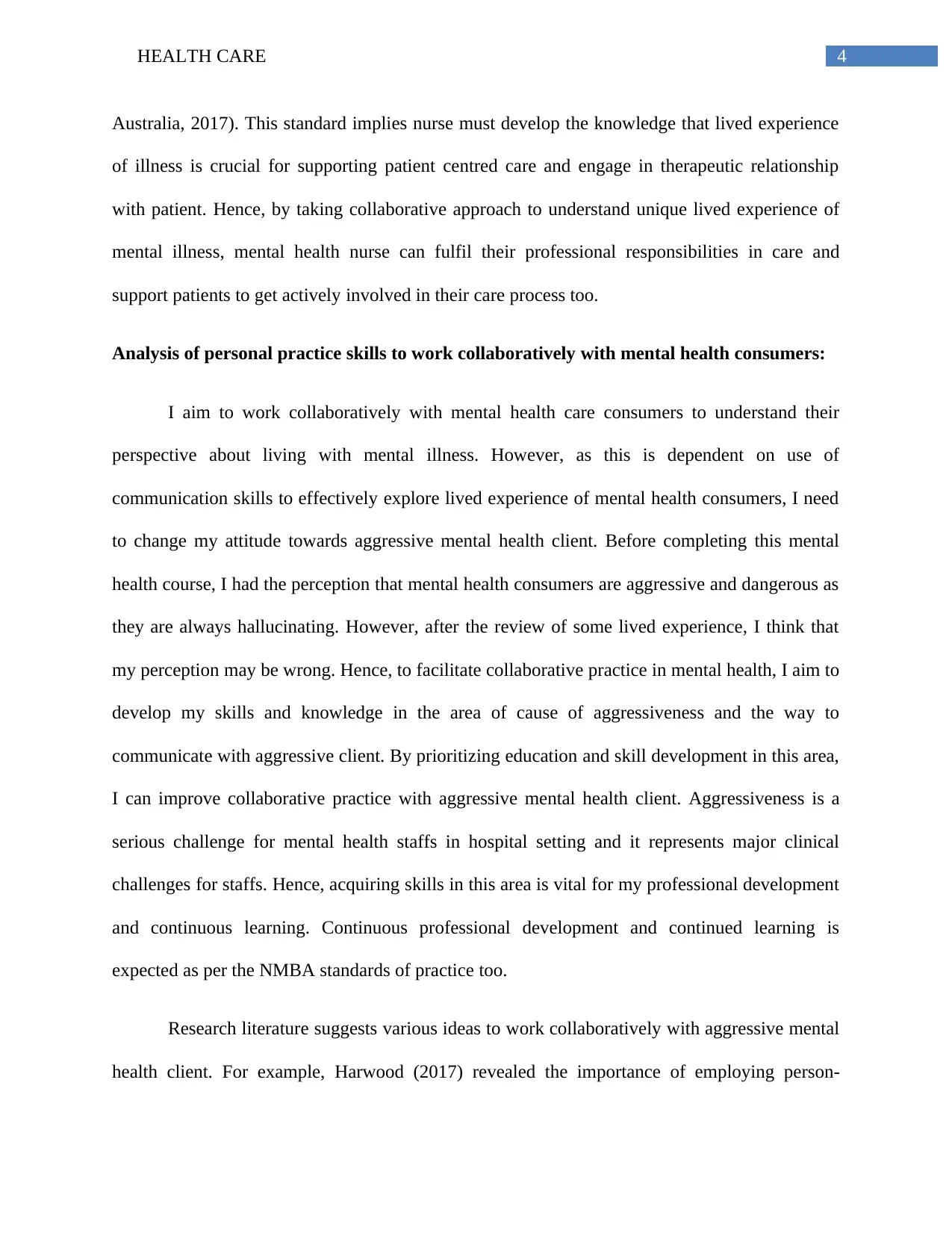
4HEALTH CARE
Australia, 2017). This standard implies nurse must develop the knowledge that lived experience
of illness is crucial for supporting patient centred care and engage in therapeutic relationship
with patient. Hence, by taking collaborative approach to understand unique lived experience of
mental illness, mental health nurse can fulfil their professional responsibilities in care and
support patients to get actively involved in their care process too.
Analysis of personal practice skills to work collaboratively with mental health consumers:
I aim to work collaboratively with mental health care consumers to understand their
perspective about living with mental illness. However, as this is dependent on use of
communication skills to effectively explore lived experience of mental health consumers, I need
to change my attitude towards aggressive mental health client. Before completing this mental
health course, I had the perception that mental health consumers are aggressive and dangerous as
they are always hallucinating. However, after the review of some lived experience, I think that
my perception may be wrong. Hence, to facilitate collaborative practice in mental health, I aim to
develop my skills and knowledge in the area of cause of aggressiveness and the way to
communicate with aggressive client. By prioritizing education and skill development in this area,
I can improve collaborative practice with aggressive mental health client. Aggressiveness is a
serious challenge for mental health staffs in hospital setting and it represents major clinical
challenges for staffs. Hence, acquiring skills in this area is vital for my professional development
and continuous learning. Continuous professional development and continued learning is
expected as per the NMBA standards of practice too.
Research literature suggests various ideas to work collaboratively with aggressive mental
health client. For example, Harwood (2017) revealed the importance of employing person-
Australia, 2017). This standard implies nurse must develop the knowledge that lived experience
of illness is crucial for supporting patient centred care and engage in therapeutic relationship
with patient. Hence, by taking collaborative approach to understand unique lived experience of
mental illness, mental health nurse can fulfil their professional responsibilities in care and
support patients to get actively involved in their care process too.
Analysis of personal practice skills to work collaboratively with mental health consumers:
I aim to work collaboratively with mental health care consumers to understand their
perspective about living with mental illness. However, as this is dependent on use of
communication skills to effectively explore lived experience of mental health consumers, I need
to change my attitude towards aggressive mental health client. Before completing this mental
health course, I had the perception that mental health consumers are aggressive and dangerous as
they are always hallucinating. However, after the review of some lived experience, I think that
my perception may be wrong. Hence, to facilitate collaborative practice in mental health, I aim to
develop my skills and knowledge in the area of cause of aggressiveness and the way to
communicate with aggressive client. By prioritizing education and skill development in this area,
I can improve collaborative practice with aggressive mental health client. Aggressiveness is a
serious challenge for mental health staffs in hospital setting and it represents major clinical
challenges for staffs. Hence, acquiring skills in this area is vital for my professional development
and continuous learning. Continuous professional development and continued learning is
expected as per the NMBA standards of practice too.
Research literature suggests various ideas to work collaboratively with aggressive mental
health client. For example, Harwood (2017) revealed the importance of employing person-
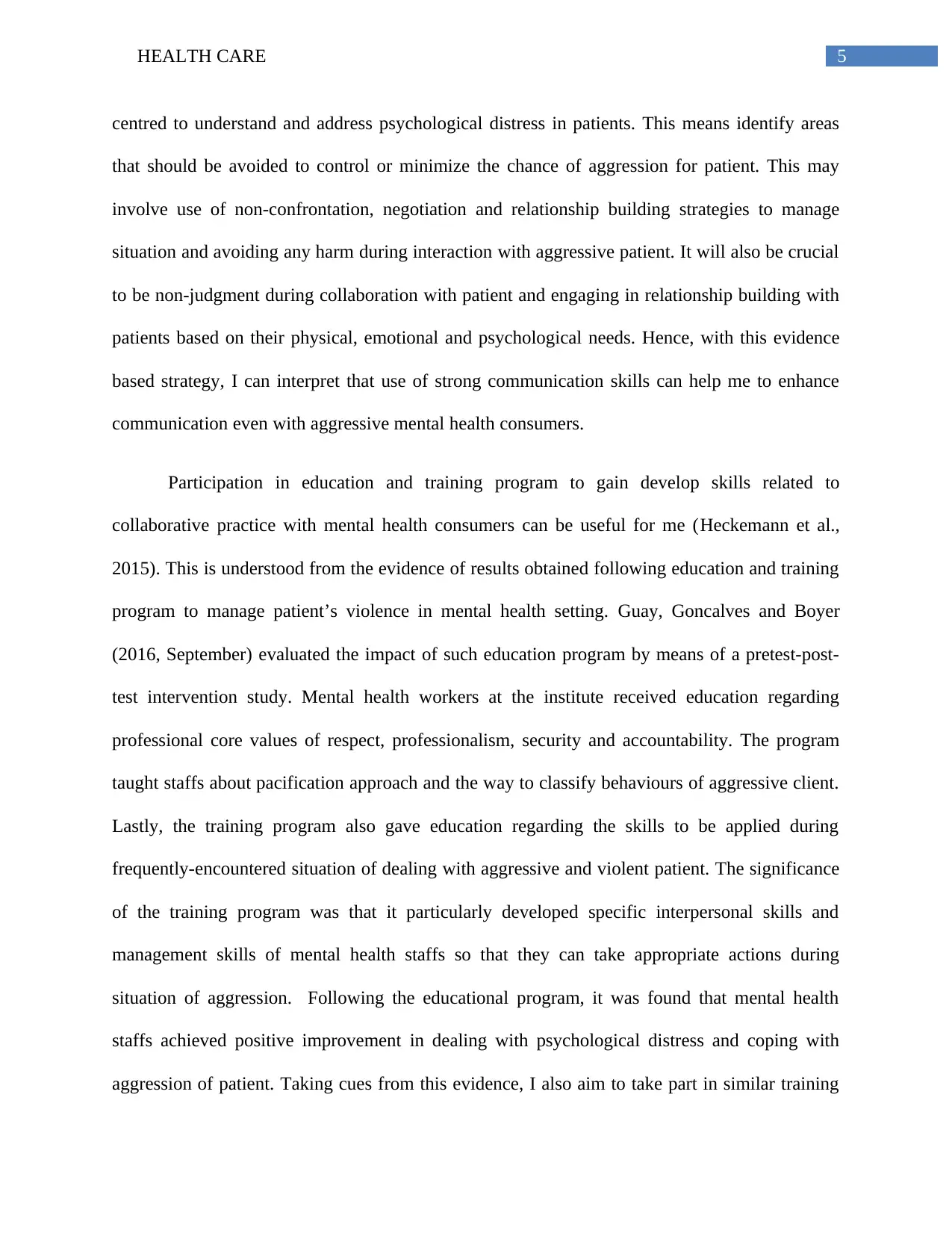
5HEALTH CARE
centred to understand and address psychological distress in patients. This means identify areas
that should be avoided to control or minimize the chance of aggression for patient. This may
involve use of non-confrontation, negotiation and relationship building strategies to manage
situation and avoiding any harm during interaction with aggressive patient. It will also be crucial
to be non-judgment during collaboration with patient and engaging in relationship building with
patients based on their physical, emotional and psychological needs. Hence, with this evidence
based strategy, I can interpret that use of strong communication skills can help me to enhance
communication even with aggressive mental health consumers.
Participation in education and training program to gain develop skills related to
collaborative practice with mental health consumers can be useful for me (Heckemann et al.,
2015). This is understood from the evidence of results obtained following education and training
program to manage patient’s violence in mental health setting. Guay, Goncalves and Boyer
(2016, September) evaluated the impact of such education program by means of a pretest-post-
test intervention study. Mental health workers at the institute received education regarding
professional core values of respect, professionalism, security and accountability. The program
taught staffs about pacification approach and the way to classify behaviours of aggressive client.
Lastly, the training program also gave education regarding the skills to be applied during
frequently-encountered situation of dealing with aggressive and violent patient. The significance
of the training program was that it particularly developed specific interpersonal skills and
management skills of mental health staffs so that they can take appropriate actions during
situation of aggression. Following the educational program, it was found that mental health
staffs achieved positive improvement in dealing with psychological distress and coping with
aggression of patient. Taking cues from this evidence, I also aim to take part in similar training
centred to understand and address psychological distress in patients. This means identify areas
that should be avoided to control or minimize the chance of aggression for patient. This may
involve use of non-confrontation, negotiation and relationship building strategies to manage
situation and avoiding any harm during interaction with aggressive patient. It will also be crucial
to be non-judgment during collaboration with patient and engaging in relationship building with
patients based on their physical, emotional and psychological needs. Hence, with this evidence
based strategy, I can interpret that use of strong communication skills can help me to enhance
communication even with aggressive mental health consumers.
Participation in education and training program to gain develop skills related to
collaborative practice with mental health consumers can be useful for me (Heckemann et al.,
2015). This is understood from the evidence of results obtained following education and training
program to manage patient’s violence in mental health setting. Guay, Goncalves and Boyer
(2016, September) evaluated the impact of such education program by means of a pretest-post-
test intervention study. Mental health workers at the institute received education regarding
professional core values of respect, professionalism, security and accountability. The program
taught staffs about pacification approach and the way to classify behaviours of aggressive client.
Lastly, the training program also gave education regarding the skills to be applied during
frequently-encountered situation of dealing with aggressive and violent patient. The significance
of the training program was that it particularly developed specific interpersonal skills and
management skills of mental health staffs so that they can take appropriate actions during
situation of aggression. Following the educational program, it was found that mental health
staffs achieved positive improvement in dealing with psychological distress and coping with
aggression of patient. Taking cues from this evidence, I also aim to take part in similar training
⊘ This is a preview!⊘
Do you want full access?
Subscribe today to unlock all pages.

Trusted by 1+ million students worldwide
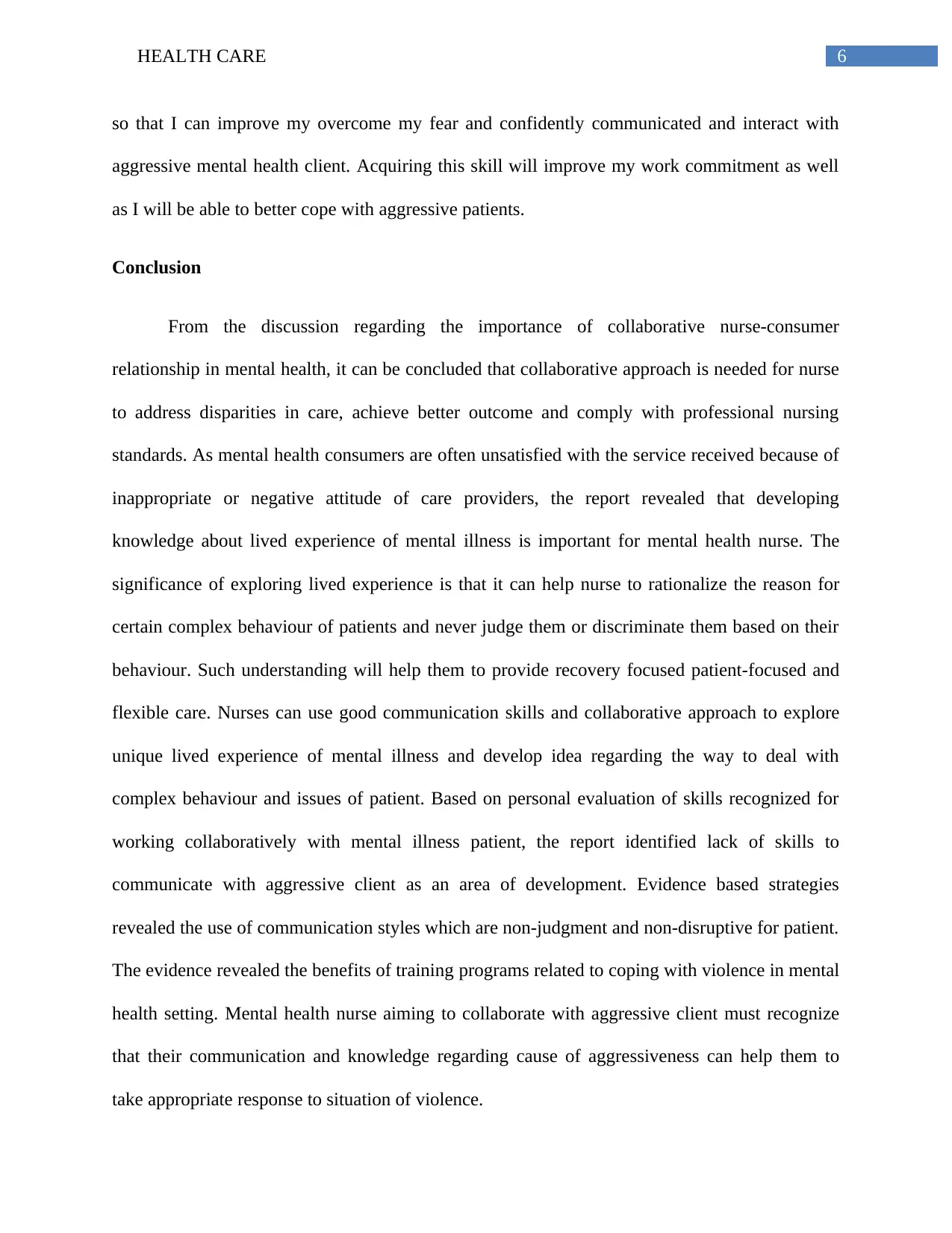
6HEALTH CARE
so that I can improve my overcome my fear and confidently communicated and interact with
aggressive mental health client. Acquiring this skill will improve my work commitment as well
as I will be able to better cope with aggressive patients.
Conclusion
From the discussion regarding the importance of collaborative nurse-consumer
relationship in mental health, it can be concluded that collaborative approach is needed for nurse
to address disparities in care, achieve better outcome and comply with professional nursing
standards. As mental health consumers are often unsatisfied with the service received because of
inappropriate or negative attitude of care providers, the report revealed that developing
knowledge about lived experience of mental illness is important for mental health nurse. The
significance of exploring lived experience is that it can help nurse to rationalize the reason for
certain complex behaviour of patients and never judge them or discriminate them based on their
behaviour. Such understanding will help them to provide recovery focused patient-focused and
flexible care. Nurses can use good communication skills and collaborative approach to explore
unique lived experience of mental illness and develop idea regarding the way to deal with
complex behaviour and issues of patient. Based on personal evaluation of skills recognized for
working collaboratively with mental illness patient, the report identified lack of skills to
communicate with aggressive client as an area of development. Evidence based strategies
revealed the use of communication styles which are non-judgment and non-disruptive for patient.
The evidence revealed the benefits of training programs related to coping with violence in mental
health setting. Mental health nurse aiming to collaborate with aggressive client must recognize
that their communication and knowledge regarding cause of aggressiveness can help them to
take appropriate response to situation of violence.
so that I can improve my overcome my fear and confidently communicated and interact with
aggressive mental health client. Acquiring this skill will improve my work commitment as well
as I will be able to better cope with aggressive patients.
Conclusion
From the discussion regarding the importance of collaborative nurse-consumer
relationship in mental health, it can be concluded that collaborative approach is needed for nurse
to address disparities in care, achieve better outcome and comply with professional nursing
standards. As mental health consumers are often unsatisfied with the service received because of
inappropriate or negative attitude of care providers, the report revealed that developing
knowledge about lived experience of mental illness is important for mental health nurse. The
significance of exploring lived experience is that it can help nurse to rationalize the reason for
certain complex behaviour of patients and never judge them or discriminate them based on their
behaviour. Such understanding will help them to provide recovery focused patient-focused and
flexible care. Nurses can use good communication skills and collaborative approach to explore
unique lived experience of mental illness and develop idea regarding the way to deal with
complex behaviour and issues of patient. Based on personal evaluation of skills recognized for
working collaboratively with mental illness patient, the report identified lack of skills to
communicate with aggressive client as an area of development. Evidence based strategies
revealed the use of communication styles which are non-judgment and non-disruptive for patient.
The evidence revealed the benefits of training programs related to coping with violence in mental
health setting. Mental health nurse aiming to collaborate with aggressive client must recognize
that their communication and knowledge regarding cause of aggressiveness can help them to
take appropriate response to situation of violence.
Paraphrase This Document
Need a fresh take? Get an instant paraphrase of this document with our AI Paraphraser
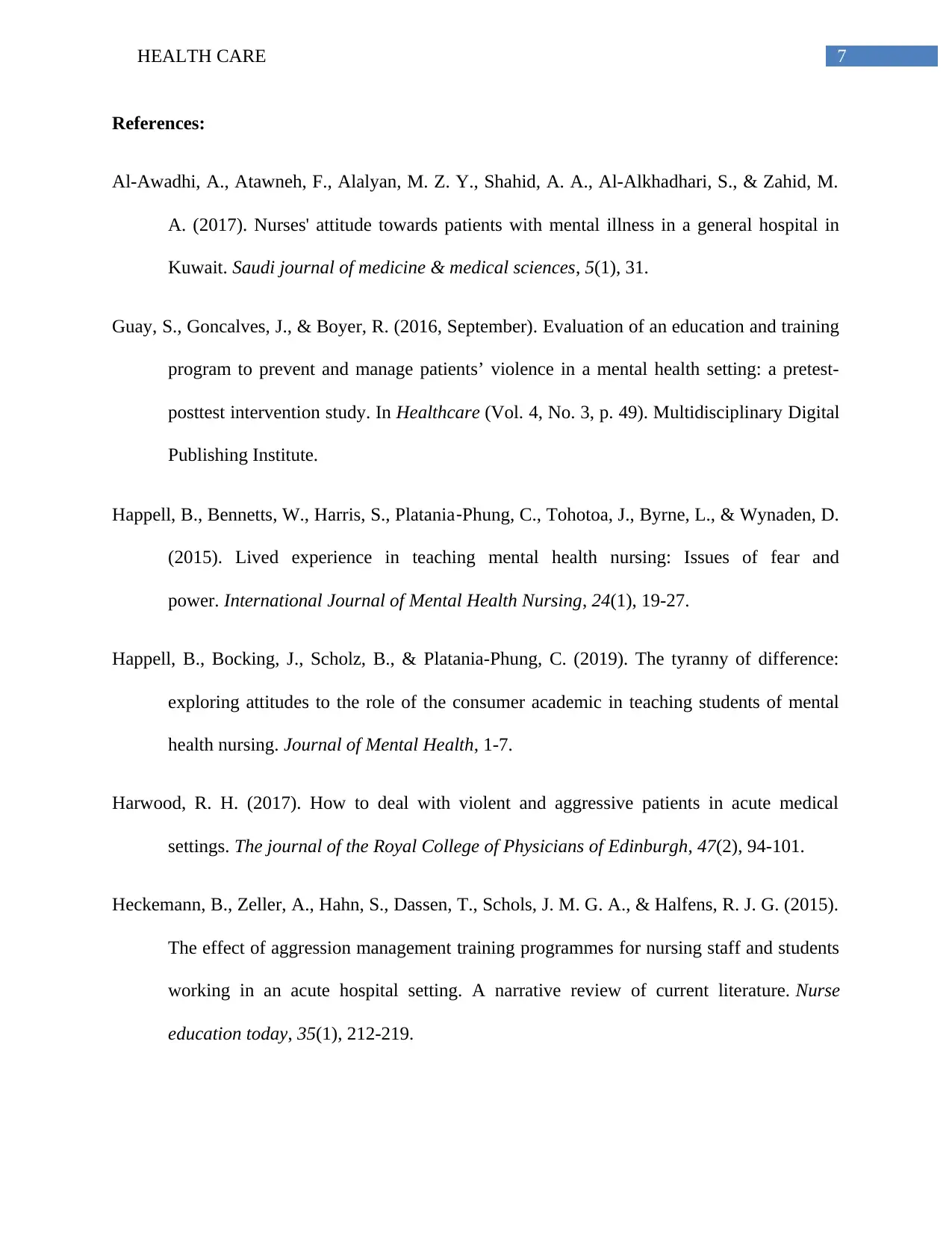
7HEALTH CARE
References:
Al-Awadhi, A., Atawneh, F., Alalyan, M. Z. Y., Shahid, A. A., Al-Alkhadhari, S., & Zahid, M.
A. (2017). Nurses' attitude towards patients with mental illness in a general hospital in
Kuwait. Saudi journal of medicine & medical sciences, 5(1), 31.
Guay, S., Goncalves, J., & Boyer, R. (2016, September). Evaluation of an education and training
program to prevent and manage patients’ violence in a mental health setting: a pretest-
posttest intervention study. In Healthcare (Vol. 4, No. 3, p. 49). Multidisciplinary Digital
Publishing Institute.
Happell, B., Bennetts, W., Harris, S., Platania‐Phung, C., Tohotoa, J., Byrne, L., & Wynaden, D.
(2015). Lived experience in teaching mental health nursing: Issues of fear and
power. International Journal of Mental Health Nursing, 24(1), 19-27.
Happell, B., Bocking, J., Scholz, B., & Platania-Phung, C. (2019). The tyranny of difference:
exploring attitudes to the role of the consumer academic in teaching students of mental
health nursing. Journal of Mental Health, 1-7.
Harwood, R. H. (2017). How to deal with violent and aggressive patients in acute medical
settings. The journal of the Royal College of Physicians of Edinburgh, 47(2), 94-101.
Heckemann, B., Zeller, A., Hahn, S., Dassen, T., Schols, J. M. G. A., & Halfens, R. J. G. (2015).
The effect of aggression management training programmes for nursing staff and students
working in an acute hospital setting. A narrative review of current literature. Nurse
education today, 35(1), 212-219.
References:
Al-Awadhi, A., Atawneh, F., Alalyan, M. Z. Y., Shahid, A. A., Al-Alkhadhari, S., & Zahid, M.
A. (2017). Nurses' attitude towards patients with mental illness in a general hospital in
Kuwait. Saudi journal of medicine & medical sciences, 5(1), 31.
Guay, S., Goncalves, J., & Boyer, R. (2016, September). Evaluation of an education and training
program to prevent and manage patients’ violence in a mental health setting: a pretest-
posttest intervention study. In Healthcare (Vol. 4, No. 3, p. 49). Multidisciplinary Digital
Publishing Institute.
Happell, B., Bennetts, W., Harris, S., Platania‐Phung, C., Tohotoa, J., Byrne, L., & Wynaden, D.
(2015). Lived experience in teaching mental health nursing: Issues of fear and
power. International Journal of Mental Health Nursing, 24(1), 19-27.
Happell, B., Bocking, J., Scholz, B., & Platania-Phung, C. (2019). The tyranny of difference:
exploring attitudes to the role of the consumer academic in teaching students of mental
health nursing. Journal of Mental Health, 1-7.
Harwood, R. H. (2017). How to deal with violent and aggressive patients in acute medical
settings. The journal of the Royal College of Physicians of Edinburgh, 47(2), 94-101.
Heckemann, B., Zeller, A., Hahn, S., Dassen, T., Schols, J. M. G. A., & Halfens, R. J. G. (2015).
The effect of aggression management training programmes for nursing staff and students
working in an acute hospital setting. A narrative review of current literature. Nurse
education today, 35(1), 212-219.
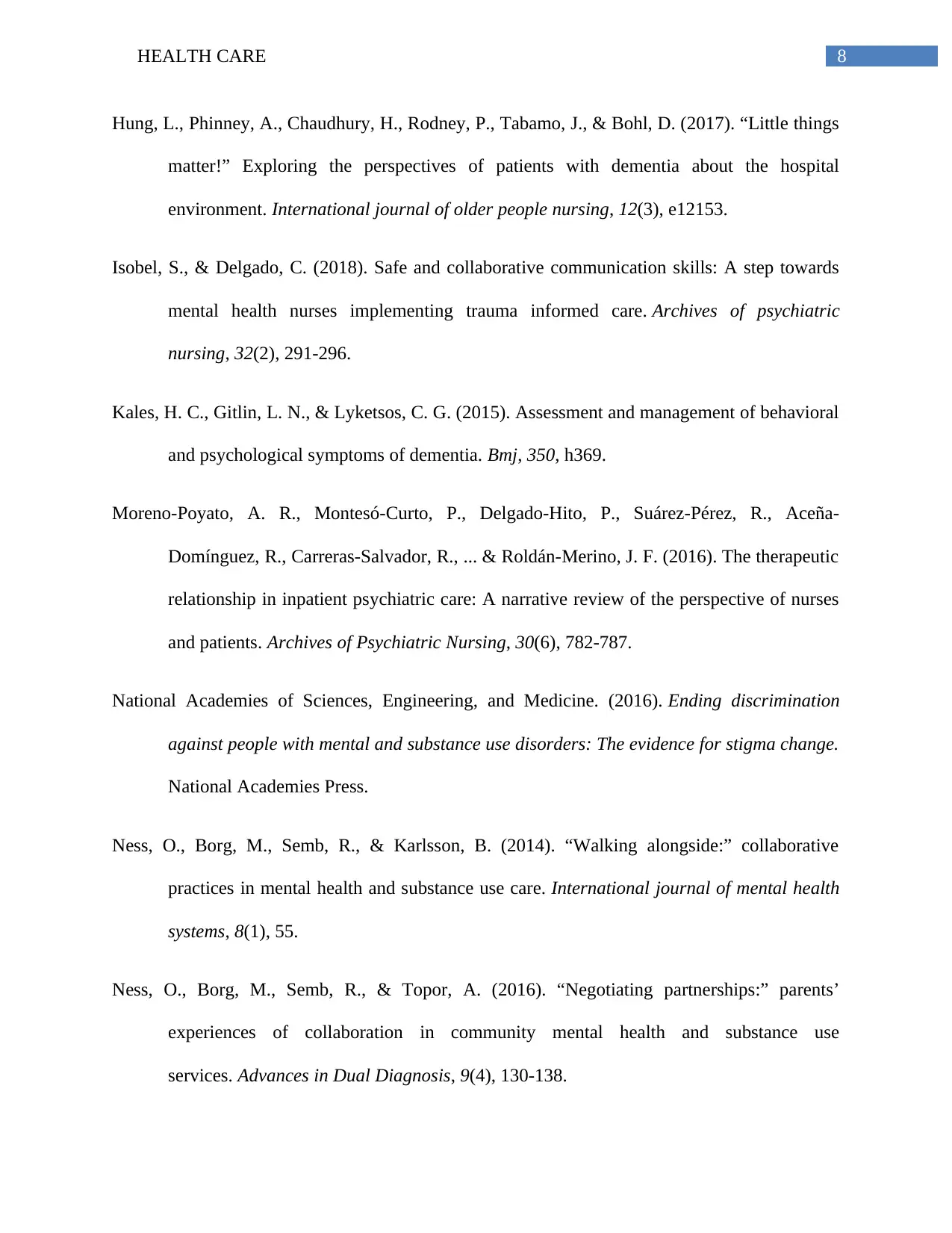
8HEALTH CARE
Hung, L., Phinney, A., Chaudhury, H., Rodney, P., Tabamo, J., & Bohl, D. (2017). “Little things
matter!” Exploring the perspectives of patients with dementia about the hospital
environment. International journal of older people nursing, 12(3), e12153.
Isobel, S., & Delgado, C. (2018). Safe and collaborative communication skills: A step towards
mental health nurses implementing trauma informed care. Archives of psychiatric
nursing, 32(2), 291-296.
Kales, H. C., Gitlin, L. N., & Lyketsos, C. G. (2015). Assessment and management of behavioral
and psychological symptoms of dementia. Bmj, 350, h369.
Moreno-Poyato, A. R., Montesó-Curto, P., Delgado-Hito, P., Suárez-Pérez, R., Aceña-
Domínguez, R., Carreras-Salvador, R., ... & Roldán-Merino, J. F. (2016). The therapeutic
relationship in inpatient psychiatric care: A narrative review of the perspective of nurses
and patients. Archives of Psychiatric Nursing, 30(6), 782-787.
National Academies of Sciences, Engineering, and Medicine. (2016). Ending discrimination
against people with mental and substance use disorders: The evidence for stigma change.
National Academies Press.
Ness, O., Borg, M., Semb, R., & Karlsson, B. (2014). “Walking alongside:” collaborative
practices in mental health and substance use care. International journal of mental health
systems, 8(1), 55.
Ness, O., Borg, M., Semb, R., & Topor, A. (2016). “Negotiating partnerships:” parents’
experiences of collaboration in community mental health and substance use
services. Advances in Dual Diagnosis, 9(4), 130-138.
Hung, L., Phinney, A., Chaudhury, H., Rodney, P., Tabamo, J., & Bohl, D. (2017). “Little things
matter!” Exploring the perspectives of patients with dementia about the hospital
environment. International journal of older people nursing, 12(3), e12153.
Isobel, S., & Delgado, C. (2018). Safe and collaborative communication skills: A step towards
mental health nurses implementing trauma informed care. Archives of psychiatric
nursing, 32(2), 291-296.
Kales, H. C., Gitlin, L. N., & Lyketsos, C. G. (2015). Assessment and management of behavioral
and psychological symptoms of dementia. Bmj, 350, h369.
Moreno-Poyato, A. R., Montesó-Curto, P., Delgado-Hito, P., Suárez-Pérez, R., Aceña-
Domínguez, R., Carreras-Salvador, R., ... & Roldán-Merino, J. F. (2016). The therapeutic
relationship in inpatient psychiatric care: A narrative review of the perspective of nurses
and patients. Archives of Psychiatric Nursing, 30(6), 782-787.
National Academies of Sciences, Engineering, and Medicine. (2016). Ending discrimination
against people with mental and substance use disorders: The evidence for stigma change.
National Academies Press.
Ness, O., Borg, M., Semb, R., & Karlsson, B. (2014). “Walking alongside:” collaborative
practices in mental health and substance use care. International journal of mental health
systems, 8(1), 55.
Ness, O., Borg, M., Semb, R., & Topor, A. (2016). “Negotiating partnerships:” parents’
experiences of collaboration in community mental health and substance use
services. Advances in Dual Diagnosis, 9(4), 130-138.
⊘ This is a preview!⊘
Do you want full access?
Subscribe today to unlock all pages.

Trusted by 1+ million students worldwide
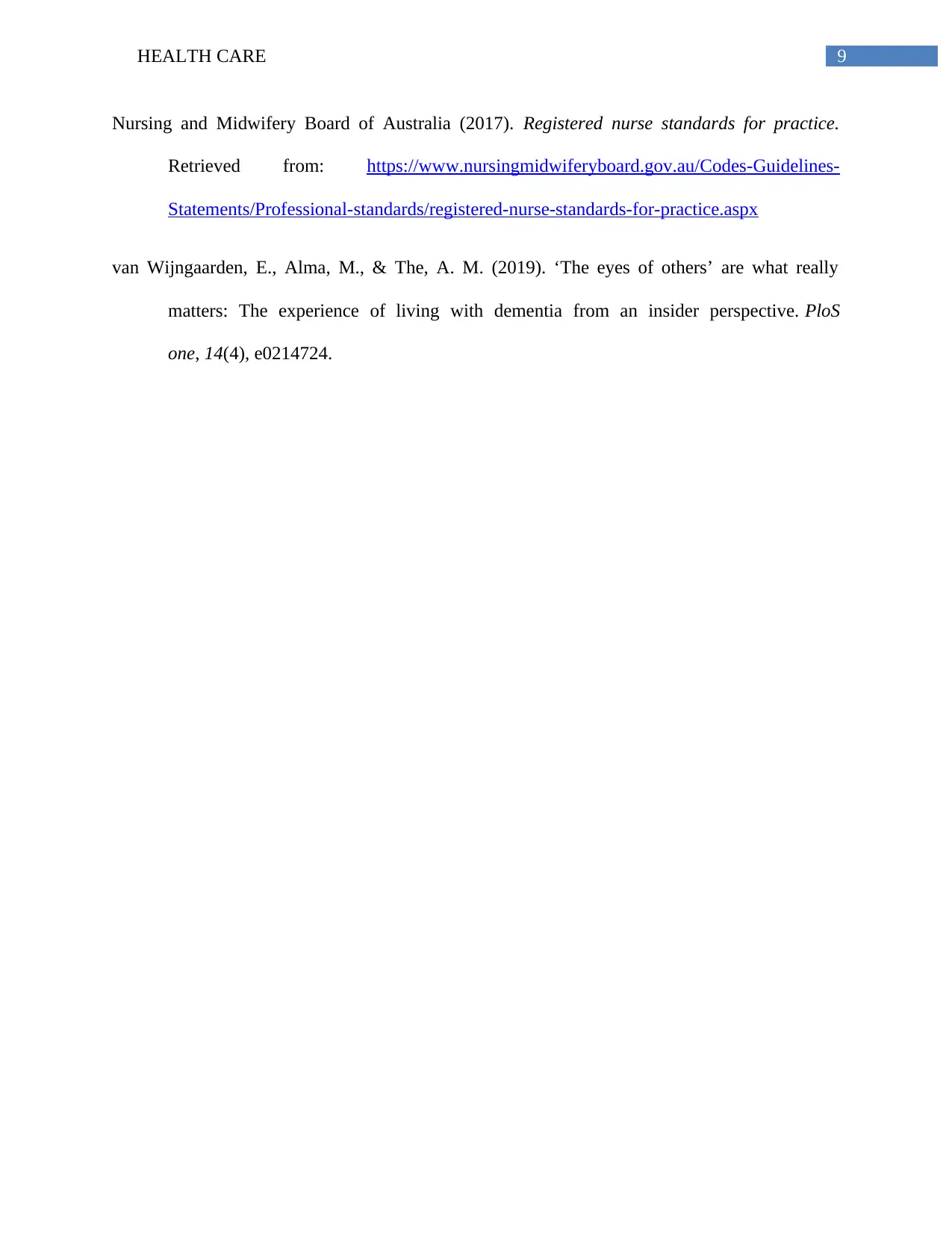
9HEALTH CARE
Nursing and Midwifery Board of Australia (2017). Registered nurse standards for practice.
Retrieved from: https://www.nursingmidwiferyboard.gov.au/Codes-Guidelines-
Statements/Professional-standards/registered-nurse-standards-for-practice.aspx
van Wijngaarden, E., Alma, M., & The, A. M. (2019). ‘The eyes of others’ are what really
matters: The experience of living with dementia from an insider perspective. PloS
one, 14(4), e0214724.
Nursing and Midwifery Board of Australia (2017). Registered nurse standards for practice.
Retrieved from: https://www.nursingmidwiferyboard.gov.au/Codes-Guidelines-
Statements/Professional-standards/registered-nurse-standards-for-practice.aspx
van Wijngaarden, E., Alma, M., & The, A. M. (2019). ‘The eyes of others’ are what really
matters: The experience of living with dementia from an insider perspective. PloS
one, 14(4), e0214724.
1 out of 10
Related Documents
Your All-in-One AI-Powered Toolkit for Academic Success.
+13062052269
info@desklib.com
Available 24*7 on WhatsApp / Email
![[object Object]](/_next/static/media/star-bottom.7253800d.svg)
Unlock your academic potential
Copyright © 2020–2026 A2Z Services. All Rights Reserved. Developed and managed by ZUCOL.





